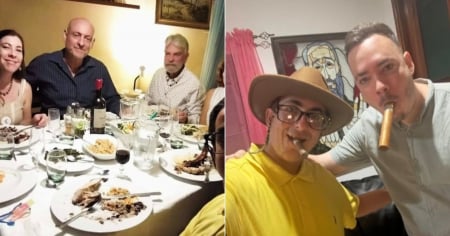In a gesture that highlights the strong influence of the Cuban regime over Caracas, dictator Raúl Castro sent his grandson and his personal guard to serve at the swearing-in ceremony of Nicolás Maduro as president of Venezuela.
During the televised broadcast of the ceremony, Raúl Guillermo Rodríguez Castro (El Cangrejo), grandson and chief of Castro's personal guard, and son of the late Luis Alberto Rodríguez López-Callejas, was seen performing bodyguard duties.
The inauguration ceremony of Maduro, which began on January 10, 2025, took place at the Legislative Palace of Venezuela, where the president was sworn in for a third term while the people protested in the streets denouncing electoral fraud.
Few heads of state attended the ceremony, including the Cuban Miguel Díaz-Canel.
Raúl Castro has maintained a close relationship with Maduro, who has been a strategic ally for Cuba during years of economic crisis and sanctions.
For years, the Venezuelan opposition has denounced the presence of Cuban military personnel in Caracas, where they make decisions even regarding the purchase of weapons.
Thousands of Venezuelans, many of them in the diaspora, continue to question the legitimacy of Maduro's government, which they accuse of manipulating election results and repressing the opposition.
In 2022, a report from the United Nations (UN) implicated Cuban military personnel in human rights violations in Venezuela since 2006, when the regimes of Fidel Castro and Hugo Chávez signed secret agreements.
The document, prepared by the United Nations Independent International Fact-Finding Mission, revealed on Tuesday in Geneva that the Cuban regime trained Venezuela's intelligence services.
"Cubans trained, advised, and participated in intelligence and counterintelligence activities with the DGCIM," confirmed the investigation, which took into account information provided by former officials of that repressive agency.
Cuban agents also "played a significant role in the development of interrogation techniques and surveillance methods in the DGCIM, as well as in the structures and objectives of the Directorates, including the Directorates of Communications and Operations. It was common for DGCIM agents to travel to Cuba for training."
Frequently Asked Questions about Cuba's Influence on Venezuela and Nicolás Maduro's Inauguration
Why is the Cuban regime considered to have influence in Venezuela?
The influence of the Cuban regime in Venezuela is evident through the presence of Cuban agents in intelligence and counterintelligence activities in the South American country. A 2022 UN report revealed that Cuba has trained and advised Venezuelan intelligence services, which has been a consistent theme in the allegations made by the Venezuelan opposition.
What role did Raúl Castro's grandson play in Nicolás Maduro's inauguration?
Raúl Guillermo Rodríguez Castro, known as "El Cangrejo," the grandson of Raúl Castro, attended the inauguration of Nicolás Maduro as head of the personal guard, highlighting the closeness and support of the Cuban regime for Maduro's government. His presence underscores Cuban influence and backing for the Venezuelan regime, especially during times of significant international scrutiny.
How has the international community reacted to Nicolás Maduro's re-election?
The reelection of Nicolás Maduro has been rejected by a large part of the international community due to the lack of transparency and legitimacy in the electoral process. Countries like the United States and other governments have questioned the results, denouncing electoral fraud and repression of the opposition. This controversy has heightened political tensions in the region.
What has been the response of the Venezuelan opposition to Maduro's new mandate?
The Venezuelan opposition, led by figures such as María Corina Machado and Edmundo González, has denounced electoral fraud and organized mass protests across the country. They claim that Maduro remains in power through electoral manipulation and repression of his opponents. Despite the risks, they continue to mobilize against the chavista regime, seeking international support for a democratic transition.
How has the Cuban government positioned itself regarding electoral fraud in Venezuela?
The Cuban government has shown unconditional support for Nicolás Maduro's regime, acknowledging his electoral victory despite allegations of fraud. Cuba has been one of the few countries to congratulate Maduro on his proclamation as president, overlooking the criticism and rejection from the international community.
Filed under:
